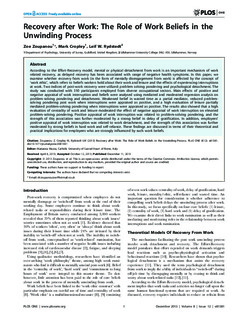| dc.description.abstract | According to the Effort-Recovery model, mental or physical detachment from work is an important mechanism of work related recovery, as delayed recovery has been associated with range of negative health symptoms. In this paper, we examine whether recovery from work (in the form of mentally disengagement from work) is affected by the concept of ‘work ethic’, which refers to beliefs workers hold about their work and leisure and the effects of experiencing interruptions at work. Two indices of post-work recovery were utilized: problem solving pondering and psychological detachment. The study was conducted with 310 participants employed from diverse occupational sectors. Main effects of positive and negative appraisal of work interruption and beliefs were analysed using mediated and moderated regression analysis on problem-solving pondering and detachment. Weakened belief in wasted time as a partial mediator, reduced problem-solving pondering post work when interruptions were appraised as positive, and a high evaluation of leisure partially mediated problem-solving pondering when interruptions were appraised as positive. The results also showed that a high evaluation of centrality of work and leisure moderated the effect of negative appraisal of work interruption on elevated problem-solving pondering. Positive appraisal of work interruption was related to problem-solving pondering, and the strength of this association was further moderated by a strong belief in delay of gratification. In addition, employees' positive appraisal of work interruption was related to work detachment, and the strength of this association was further moderated by strong beliefs in hard work and self-reliance. These findings are discussed in terms of their theoretical and practical implications for employees who are strongly influenced by such work beliefs. | nb_NO |
